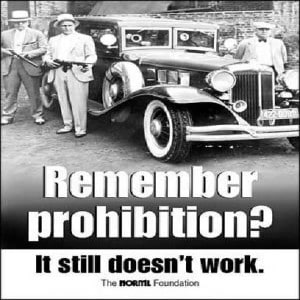 By Paul Armentano, NORML Deputy Director
By Paul Armentano, NORML Deputy Director
“First they ignore you, then they laugh at you, then they fight you, then you win.”
— Mahatma Gandhi
What can I say? I’m flattered. David Mineta, deputy director for demand reduction in the Office of National Drug Control Policy, has taken time to publicly respond to little ol’ me. I wonder if they pronounce ‘Armentano’ phonetically at the Drug Czar’s office?
The back story: Last week NORML Board member Paul Kuhn and I published a guest commentary in Nashville’s largest daily newspaper,The Tennessean, opining in favor of H.R. 2306, the ‘Ending Federal Marijuana Prohibition Act of 2011. Here’s an excerpt:
Marijuana legalization bill offers safer alternative
via The TennesseanWe know tobacco is the leading cause of death in America, contributing to 400,000 deaths each year. So it’s hardly any wonder the FDA will require the placement of prominent warning labels. Alcohol is the third-leading cause of death in America. The World Health Organization reported earlier this year that “alcohol causes nearly 4 percent of deaths worldwide, more than AIDS, tuberculosis or violence.”
… What about marijuana? With every other drug from Advil and alcohol to Zantac, a correct dose is effective, but too high a dose kills the patient. No dose of marijuana is capable of causing a fatal overdose.
… And unlike alcohol and tobacco, adverse effects of even heavy cannabis use are minimal. There is no epidemiological evidence in any country, after scores of studies and centuries of use by tens of millions of people, that marijuana smokers have a shorter life expectancy than non-smokers.
… They don’t become violent at sports events or beat their spouses and children. They don’t get heart disease, cancer, brain damage or any other deadly illness at a higher rate than those who abstain. In fact, a pair of studies conducted by Kaiser Permanente found that marijuana use, even long-term, was not associated with elevated levels of mortality or incidences of cancer, including types of cancers associated with tobacco smoking.
… America is on a path to allow adults to choose a safer alternative to tobacco and alcohol. And create more tax revenue and more jobs in Tennessee. And more freedom.
Apparently quite a few people read our editorial, including some folks at the Drug Czar’s office. And it must have gotten under their skin because today the White House responded with this.
Movement for legalized marijuana ignores dangers
via The TennesseanProponents of marijuana legalization often argue it will do everything from fixing our economy to ending violent crime (“Marijuana legalization bill offers safer alternative,” Tennessee Voices, Aug. 15). Yet, the science is clear: Marijuana use is not a benign drug and it is harmful to public health and safety.
… Would marijuana legalization make Tennessee healthier or safer? One needs to look no further than Tennessee’s current painful experience with prescription drug abuse. In Tennessee, prescription drugs are legal, regulated, and taxed – and yet rates of the abuse of pain relievers in the state exceed the national average by more than 10 percent.
Nationally, someone dies from an unintentional drug overdose – driven in large part by prescription drug abuse – on average every 19 minutes. What would America look like if we had just as many people using marijuana as we currently have smoking cigarettes, abusing alcohol, and abusing prescription drugs?
The classic ‘bait-and-switch’ goes on and on, but you get the idea. But I’m not sure the Drug Czar’s office does. After all, if their logic above had even a hint of consistency then they would be arguing for the criminal prohibition of cigarettes, alcohol, and prescription drugs. And lots of other things.
 Yet when it comes to Americans’ use of substances like tobacco, booze, and prescription drugs – substances that pose far greater dangers to health than does cannabis – the White House recognizes that prohibition is not the answer: regulation and education are. So why does the Drug Czar’s office fail to apply this same common-sense principle to pot? Perhaps it has something to do with the federal requirement requiring the office to lie about legalization.
Yet when it comes to Americans’ use of substances like tobacco, booze, and prescription drugs – substances that pose far greater dangers to health than does cannabis – the White House recognizes that prohibition is not the answer: regulation and education are. So why does the Drug Czar’s office fail to apply this same common-sense principle to pot? Perhaps it has something to do with the federal requirement requiring the office to lie about legalization.
Finally, as to the specific question: ‘What would America look like if we had just as many people using marijuana as are presently using tobacco, alcohol, and prescription medications?’ Well, what does America look like today? After all, the federal government imposed criminal prohibition over 70 years ago; yet today that very same federal government admits that over one out of ten Americans admit to having using cannabis in the past year. Among those age 18 to 25, almost half admit to consuming cannabis recently!
The question isn’t ‘What if Americans consumed marijuana?’ The reality is that tens of millions of Americans have and do consume marijuana. Most do so privately and responsibly. Legalizing cannabis simply acknowledges this reality and seeks to regulate the behavior appropriately. In a free society, why would even consider doing differently?






